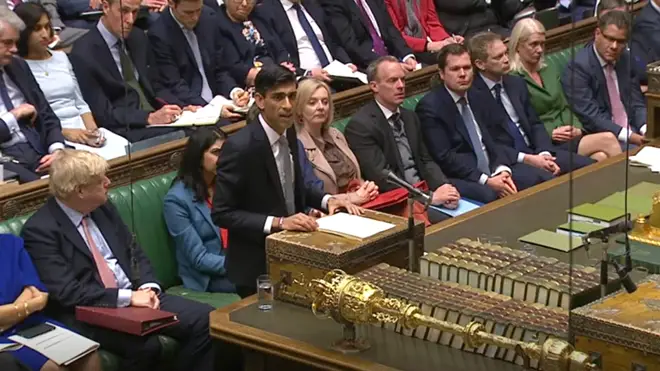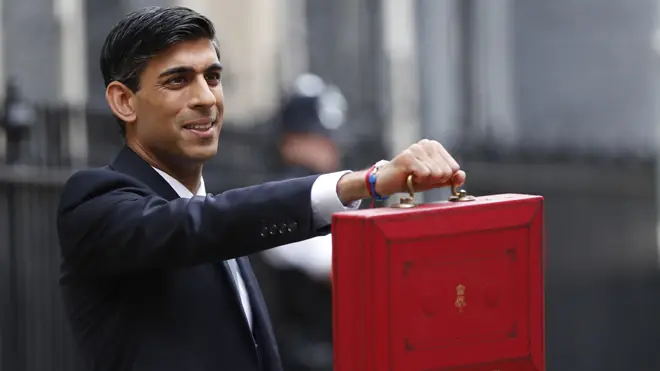
Simon Marks 3pm - 7pm
11 March 2020, 13:44

The Chancellor today announced a package of measures designed to protest the UK from the “crisis” of coronavirus worth £30 billion.
Delivering his first budget in what was described as a "confident" performance, Rishi Sunak said coronavirus would cause a “temporary disruption” to the UK economy.
Key measures announced today include:
- Giving the NHS whatever it needs to tackle coronavirus in the UK including a £5bn emergency fund
- A £1 billion business rates holiday for retail, leisure and hospitality firms with a rateable value of under £51,000 to help weather a coronavirus downturn
- The Government will fully meet the cost of providing statutory sick pay for up to 14 days for workers in firms with up to 250 employees, providing over £2 billion for up to two million businesses.
- Reforms to the benefits system to make it easier to access funds will provide a £500 million boost to the welfare system, along with a £500 million hardship fund
- A £3,000 cash grant to businesses eligible for small business rates relief
READ MORE: How will the budget affect you?

Mr Sunak said: "Taken together, the extraordinary measures I have set out today represent £7 billion to support the self-employed, businesses and vulnerable people.
"To support the NHS and other public services, I am also setting aside a £5 billion emergency response fund - and will go further if necessary."
Other plans represented another £18 billion of "additional fiscal loosening" and "that means I am announcing today, in total, a £30 billion fiscal stimulus to support British people, British jobs and British businesses through this moment".
READ MORE: Follow all the latest budget reaction LIVE
Hours before the Budget, the Bank of England set the scene with an emergency interest rate cut from 0.75% to 0.25% and a series of other measures designed to help businesses and households through a coronavirus economic shock "that could prove sharp and large, but should be temporary".
Mr Sunak said: "I know how worried people are. Worried about their health, the health of their loved ones, their jobs, their income, their businesses, their financial security.
"And I know they get even more worried when they turn on their TVs and hear talk of markets collapsing and recessions coming. People want to know what's happening, and what can be done to fix it.
"What everyone needs to know is that we are doing everything we can to keep this country, and our people, healthy and financially secure."
He added: "We will get through this - together. The British people may be worried, but they are not daunted.
"We will protect our country and our people. We will rise to this challenge."
The Chancellor said that without accounting for the impact of coronavirus, the Office for Budget Responsibility has forecast growth of 1.1% in 2020 , 1.8% in 2021 and then 1.5%, 1.3%, and 1.4% in the following years.
Despite speculation that he would ditch the framework on spending set by predecessor Sajid Javid, Mr Sunak said that his Budget is delivered "not just within the fiscal rules of the manifesto but with room to spare".
He also announced that fuel duty would be frozen for another year and there would also be no increase in duties on alcoholic drinks.
And he announced an increase in the National Insurance threshold from £8,632 to £9,500, which he said would be worth £100 a year to 31 million people.
The entrepreneurs' relief tax break will be scaled back, saving £6 billion over the next five years.
But Mr Sunak said "most of that money" will go back to firms through a series of other measures: increasing the tax break for research and development expenditure, the structures and building allowance and increasing the employment allowance by a third to £4,000.
The Chancellor also confirmed plans to abolish the "red diesel" tax relief for most sectors although farmers will continue to benefit.
A £120 million fund will be used to repair defences damaged in the winter floods, with £5.2 billion to be invested in flood defences over the next six years.
He also announced a large fund for improvements on roads in the UK, with enough money to fix “50 million” potholes.
- Extra £18bn to support the economy this year, taking the total fiscal stimulus for coronavirus planning to £30 billion
- The NHS will receive "any extra resources it needs", whether that is "millions or billions of pounds" to deal with Covid-19 on top of £6 billion of new funding
- Statutory sick pay (SSP) will be extended to all of those eligible and asked to self-isolate, even if they are not showing symptoms, and the Government will meet the cost for businesses with fewer than 250 employees of providing SSP for 14 days.
- A temporary coronavirus business interruption loan scheme will be introduced for banks to offer loans of up to £1.2 million to support small and medium-sized businesses with their cash flow.
- Business rates scrapped for businesses with a rateable value below £51,000 to support them during the Covid-19 “crisis”
- The Chancellor said borrowing will increase from 2.1% of GDP in 2019/20 to 2.4% in 2020/21 and 2.8% in 2021/22 and borrowing will then fall to 2.5%, 2.4% and 2.2% in the following years.
- The National Insurance threshold will increase from £8,632 to £9,500 and the National Living Wage will rise to £10.50 per hour by 2024 if economic conditions allow.
- Fuel duty will be frozen for another year, £26 billion will be invested in roads, and the Government will abolish £2.4 billion annual tax relief on red diesel in two years' time, but agriculture, rail, domestic heating and fishing will be exempt.
- Duties will be frozen on beer, cider, wine and spirits, and the Government will provide £1 million to support Scottish food and drink overseas and £10 million to help distilleries "go green".
- The lifetime limit for entrepreneurs' relief will be reduced from £10 million to £1 million, saving £6 billion a year, and research and development investment will be increased to £22 billion a year.
- A "plastics packaging tax" charging manufactures and importers £200 per tonne on packaging made of less than 30% of recycled plastic will be introduced in April 2022.
- The Treasury will make £120 million available immediately to repair defences damaged in the winter floods
- Mr Sunak said more than £600 billion would be spent investing in future prosperity over the next five years, taking net public investment to the highest levels in real terms since 1955.
- The so-called tampon tax will be abolished, and VAT on books, newspapers, magazines and academic journals will be scrapped from December 1.
- A £1 billion building safety fund will be set up to ensure all unsafe combustible cladding is removed from buildings above 59ft (18m) tall.